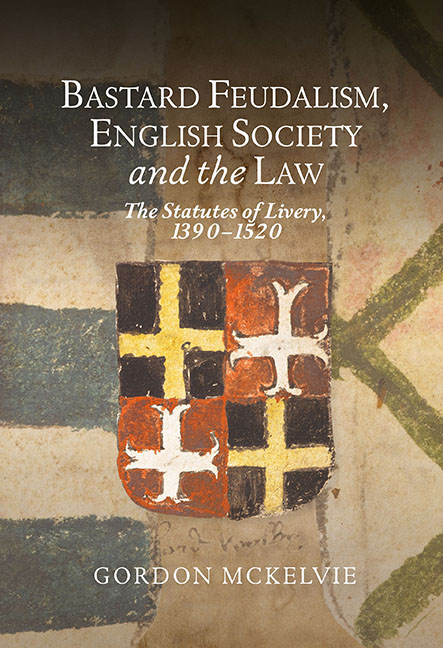Book contents
- Frontmatter
- Contents
- Acknowledgements
- Abbreviations
- Timeline of Parliamentary Activity
- Introduction
- Chapter 1 The System – Liveries and Retaining
- Chapter 2 The Early Years, 1390 to 1449
- Chapter 3 The Later Years, 1449 to 1520
- Chapter 4 Outcomes and Enforcement
- Chapter 5 The Identity of the Indicted
- Chapter 6 The Geography of the Cases
- Chapter 7 Networks and Localities
- Chapter 8 Livery and Disorder
- Chapter 9 The Urban Experience
- Conclusion
- Appendix 1 Number of Cases by Reign
- Appendix 2 Number of Cases in each County
- Appendix 3 List of Letters to Towns and Lordships
- Appendix 4 List of Local Ordinances
- Appendix 5 Letters from Henry VII to Duchy of Lancaster Officials
- Bibliography
- Index
Chapter 1 - The System – Liveries and Retaining
Published online by Cambridge University Press: 02 April 2020
- Frontmatter
- Contents
- Acknowledgements
- Abbreviations
- Timeline of Parliamentary Activity
- Introduction
- Chapter 1 The System – Liveries and Retaining
- Chapter 2 The Early Years, 1390 to 1449
- Chapter 3 The Later Years, 1449 to 1520
- Chapter 4 Outcomes and Enforcement
- Chapter 5 The Identity of the Indicted
- Chapter 6 The Geography of the Cases
- Chapter 7 Networks and Localities
- Chapter 8 Livery and Disorder
- Chapter 9 The Urban Experience
- Conclusion
- Appendix 1 Number of Cases by Reign
- Appendix 2 Number of Cases in each County
- Appendix 3 List of Letters to Towns and Lordships
- Appendix 4 List of Local Ordinances
- Appendix 5 Letters from Henry VII to Duchy of Lancaster Officials
- Bibliography
- Index
Summary
In order to understand the enforcement of the statutes, it is important to clarify what the problems were that the statutes were addressing. The key point about the statutes is that they were never designed to end bastard feudalism or prevent retaining or the granting of liveries, but instead sought to restrict such practices to acceptable categories of servants. The simple reason for this is that parliament did not enact legislation in a vacuum. Various social and political pressures led to the issue being discussed in parliament and the acts being passed. The wider social, political, ideological and cultural contexts need consideration because they influenced what could and could not be legislated against. In one sense this draws on the insights of the ‘new constitutional’ school of late medieval historiography which emphasises the need to take account of the language and norms of medieval political life. The term ‘constitutional’ is inherently problematic because of its Whiggish connotations and the lack of any written constitution at any point or in any place in British history. There was no formal constitution; instead there was a set of norms and implicit values that were shared by many and influenced political life, including the drafting and enforcement of laws. A more fruitful way of conceptualising the need to look beyond materialistic interests for understanding political and legal history is to think, as Michael Hicks has done, in terms of idealism.
The law and acts passed in parliament similarly illuminated the society in which a law was passed, what that society valued and its principles and preoccupations. A key source for understanding the social values that underpinned the legislation are provisos which permit the distribution of liveries beyond those defined by the statutes. These exemptions explain wider social practices and expectations and highlight the precise problems that the statutes were addressing. Stanley Chrimes argued that amendments to laws which, among other things, exempt certain persons or groups ‘cannot be dismissed as insignificant’. This chapter explains the social and cultural contexts in which the statutes were passed and operated because this enables a better understanding of the nature of the enforcement of the statutes as a whole.
- Type
- Chapter
- Information
- Bastard Feudalism, English Society and the LawThe Statutes of Livery, 1390–1520, pp. 12 - 32Publisher: Boydell & BrewerPrint publication year: 2020

